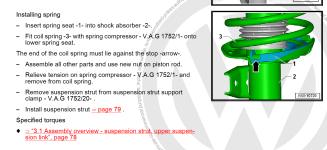Not the brake pads. I had that issue and fixed it. This noise is independent of brake application.
It all started with a squeaking rubber noise while turning at low speeds. Was advised it was bad strut bearings. Decided to buy parts and tackle it myself. Also found a set of lightly used DCC shocks off a Golf R. Figured it was a good time to replace the struts as mine had about 70,000kms on them.
Took it all apart, then re-assembled with new parts, hardware, and everything hand torqued. Creaking noise gone, however it was replaced by a “thud/sproing” when turning at low speeds. Tried silicone spray in multiple spots, didn’t work. Then thought it was the spring skipping on the strut bearing…tore it apart again and put a spring silencer between the spring and bearing. Noise went away for about 2 days, thought I fixed it, elated…noise came back, despair. Just recently replaced stock sway bar endlinks with Neuspeed adjustable ones, didn’t help.
Current setup is Golf R DCC shocks, Eibach prokit springs, Neuspeed endlinks, new oem strut mousts/bearings. I had the Eibach springs installed for over 3 years with no issues/noises before all this started. My best guess now is that the shock is bad, but I can’t even bear the thought of spending thousands on new shocks and not resolving this issue. It’s really too bad, because it’s starting ruin what is an otherwise amazing car.
It all started with a squeaking rubber noise while turning at low speeds. Was advised it was bad strut bearings. Decided to buy parts and tackle it myself. Also found a set of lightly used DCC shocks off a Golf R. Figured it was a good time to replace the struts as mine had about 70,000kms on them.
Took it all apart, then re-assembled with new parts, hardware, and everything hand torqued. Creaking noise gone, however it was replaced by a “thud/sproing” when turning at low speeds. Tried silicone spray in multiple spots, didn’t work. Then thought it was the spring skipping on the strut bearing…tore it apart again and put a spring silencer between the spring and bearing. Noise went away for about 2 days, thought I fixed it, elated…noise came back, despair. Just recently replaced stock sway bar endlinks with Neuspeed adjustable ones, didn’t help.
Current setup is Golf R DCC shocks, Eibach prokit springs, Neuspeed endlinks, new oem strut mousts/bearings. I had the Eibach springs installed for over 3 years with no issues/noises before all this started. My best guess now is that the shock is bad, but I can’t even bear the thought of spending thousands on new shocks and not resolving this issue. It’s really too bad, because it’s starting ruin what is an otherwise amazing car.

